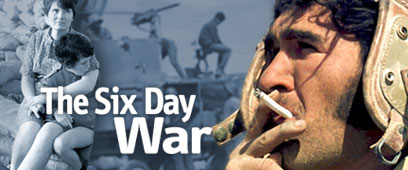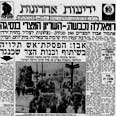

Newspaper from June 7, 1967. First photos of the Western Wall
I arrived in Israel on the Friday before the Six Day War, as a volunteer. For Shabbat (Parshat Bamidbar) we stayed in Savyon, a ritzy neighborhood close to the airport and not far from Tel Aviv. The view was absolutely breathtaking! On Sunday morning I was taken to Kibbutz Lavi, strategically perched atop a hill overlooking the Tiberias-Haifa road.
Within minutes of arriving, the kibbutz secretary assigned me a room overlooking the road and gave me a quick tour. The first thing we did was to climb to the highest point of the kibbutz, the water tower. "We are one minute away from Syria by MiG's flight," he said . I wasn't sure that I wanted to hear that… not just yet. The rest of the tour did not seem as important, in fact I barely remember it.
By the afternoon I was joined by 10 more volunteers from England, Ireland, France and the US. At dinner time, in the kibbutz' dining room surrounded by people I'd never met before, somehow, it felt like a homecoming. For the first time in my life whether I lived in Montevideo (Uruguay - where I grew up), Buenos Aires, Richmond, VA, New York City or traveling through Europe, I felt that this land was mine. Every pebble, every grain of sand, everything was mine, MINE! It's hard to describe the emotions running though me at the time, but believe me, I am reliving every single one of them as I write…
After a tasty meal in a darkened dining room (no electric lights were allowed anywhere, so as to make it harder for enemy planes to spot us, only candles and small flashlights could be used) when everyone except for the guards had gone to sleep, a horrible noise woke us. We looked out the window and realized it was coming from the road below. Some of us in the room wanted to go down to the road but the guards would not allow it. No one else in the kibbutz was outside . The road was swarming with tanks, on their way to Syria . We tried going back to sleep, but between the noise and the excitement, who could do that?
At early dawn they came for us and we were given suitable clothing (the famous Israeli kova tembel, a very distinctly shaped hat - to ward off the sun - turned out to be the most important item, a sand - colored shirt and matching shorts (both ill fitting, of course!) and boots. Then we were issued pickaxes and hoes, and told that we would be digging trenches. Easier said than done, on very rocky ground! By the afternoon, when the heat made it very hard to work, we volunteers had realized very little progress against the rocks, but we all had blisters on our hands . By contrast, a group of teenage kibbutznik girls not far from us working on a similar type of ground astounded us by how much they had accomplished…
Most of us had transistor radios and we listened to the BBC (English was a lot easier to understand than Hebrew) at 7 am that Monday morning they reported that Israeli war planes had attacked Egyptian military airfields and totally destroyed their Air Force before they could get airborne. Kol Yisrael - The Voice of Israel - not only reported no news but kept playing an hour ' s long repertoire of Hebrew songs. There was no way to corroborate the truth of this BBC story . At 8 am one of the kibbutz wives reported with glee that she just received a call from her Air Force husband . Every single Israeli plane had returned safely to base.
At 10am Israel Radio finally reported that we were in a war but gave no details and kept playing song s. Shortly thereafter there was a dog fight, directly above our heads, between an Israeli Mirage and a Syrian MiG , and the Israelis continued working seemingly without a care. We, the volunteers looked up fascinated , strangely without fea r. The MiG was shot down after a few minutes, and an armed group from the kibbutz left in two Jeeps, they came back awhile later with a piece of the MiG's tail and the Syrian pilot whom they held until members of the IDF came to pick him up.
At dinner time, we non-kibbutzniks could only talk about the news on the BBC while the kibbutznikim didn't seem to show much concern. Then came Tuesday, June 7 - the 28th of Iyar - a day that would forever change history . By late afternoon the BBC reported that the Old City of Jerusalem was in Israeli hands, a few hours later Israel Radio played a sound bite by General Motta Gur, commanding officer of the crack paratroopers brigade that captured the Western Wall: "HaKotel beyoden u - The Kotel - the Wailing Wall - is in our hands." Soon there was barely a dry eye, happiness knew no bounds…
The full import of those simple words did not totally hit me until Shavuot (the following week) when five of us found ourselves in Jerusalem. On what in the Diaspora would have been the second day of the festival we walked to Mount Zion so we could get to the Western Wall.
As we found our way through through the narrow, winding road filled with history, soaked with Jewish blood, I felt as if my ancestors were there walking with me, gently guiding me . Finally we spied the Kotel in the distance , not the sweeping plaza we have today, but a very narrow area surrounded by Arab houses and public latrines. The five of us, as if we were part of a Greek chorus in some ancient play, started crying unabashedly as little children would. Father in Heaven, we are home, we are home!!!
As we walked back through the Old City, as we saw the narrow streets filled with bazaars, with butcher shops hung with huge cuts of meat and myriad flies buzzing on and around them, with the stench of public latrines we, every single one of us, understood why of all the beautiful cities around the world the Holy One, Blessed Be He, chose Yerushalayim, Ir Hakododesh as His Holy City .















